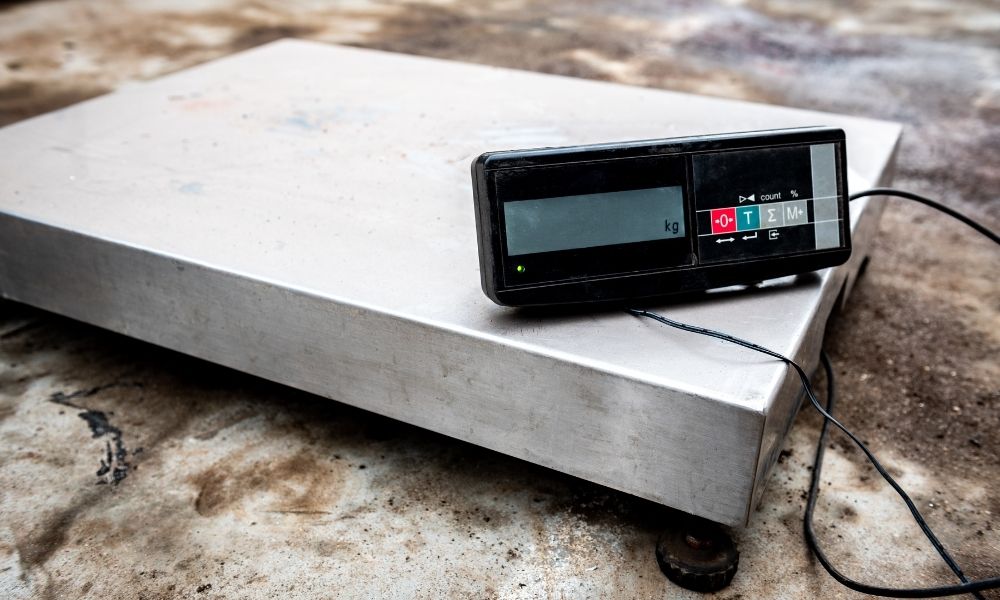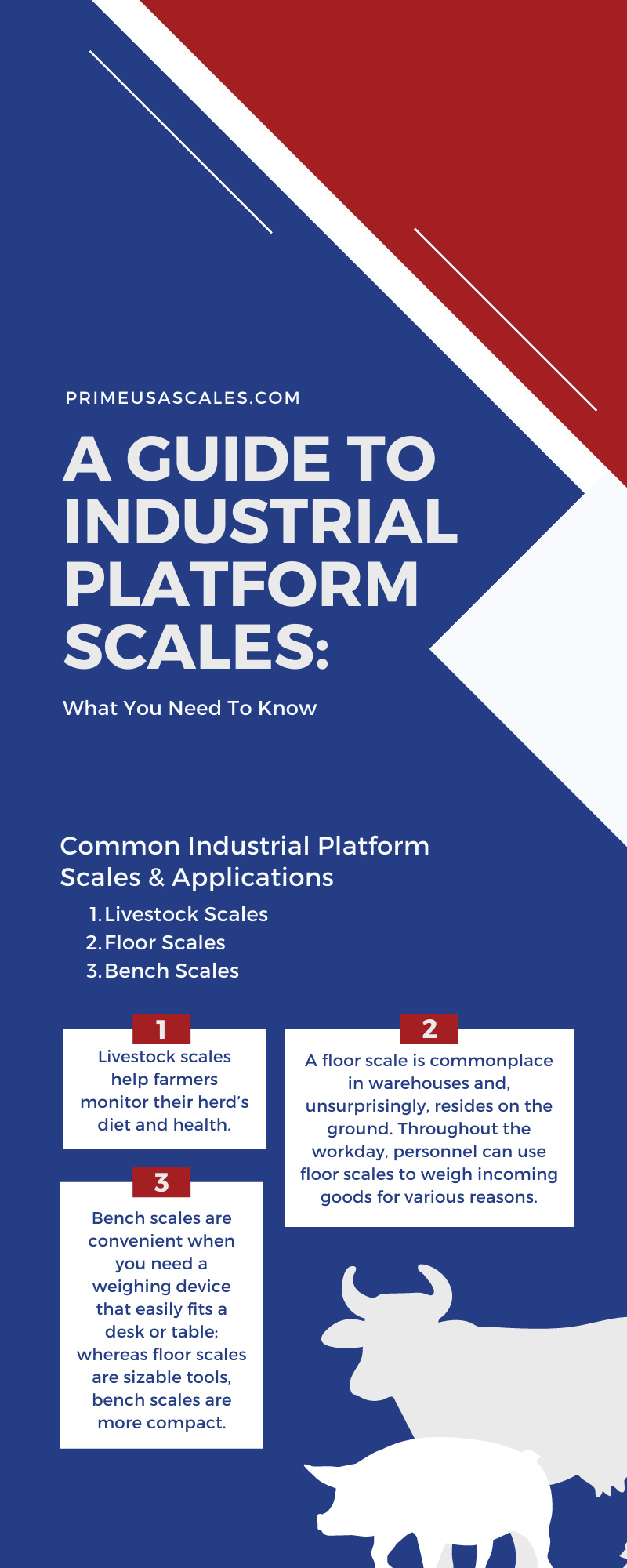When companies use scales for workplace needs, they should understand how the device works inside and out. If you take time to learn the nuances of the many industrial scales on the market, you can find and maintain the perfect one for your business needs, whether that’s weighing food, packages, or any number of goods. So, if you want to browse the market with confidence, read our guide to industrial platform scales and what you need to know about them.
Basic Functionality
Let’s start with the basics: what exactly is a platform scale? Much like the scale you might have in your bathroom or see at the doctor’s office, industrial platform scales are for calculating weight accurately.
Furthermore, these scales are weighing tools for heavier duty applications than personal use at home. As we’ll explore deeper below, these scales provide many industries with a means of calculating the weights of products in bulk.
Plus, they can capture such heavy-duty measurements without hurting the scale (if you don’t surpass the device’s load capacity). After placing materials on the platform surface, the scale measures and transmits the precise weight to a designated screen. Now, let’s break down the specifics of where you’ll commonly find these machines in use.
Common Industrial Platform Scales & Applications
As you can see from our wide range of industrial platform scales, the term doesn’t reference one type of weighing device. Instead, platform scales refer to a wide range of machines. Below, you can find the three most common types of platforms and their applications.
Livestock Scales
As the name suggests, this tool is for weighing livestock for business purposes. Furthermore, livestock scales help farmers monitor their herd’s diet and health. As a result, farmers can learn whether they’re feeding animals properly, when optimal breeding times will occur, whether an animal is sick, and much more valuable information.
Floor Scales
In addition, floor scales fall under the “industrial platform scale” umbrella. A floor scale is commonplace in warehouses and, unsurprisingly, resides on the ground. Throughout the workday, personnel can use floor scales to weigh incoming goods for various reasons.
For example, weighing goods before loading them onto trucks prevents overloading. Overloading is incredibly dangerous and puts everyone near the vehicle at risk of injury or worse. Thankfully, a seemingly simple device like floor scales can prevent such accidents from happening.
Bench Scales
Another type of industrial platform scale is a bench scale, which is a device that typically doesn’t suit the large, heavy objects that their floor-bound counterpart can. However, bench scales are convenient when you need a weighing device that easily fits a desk or table; whereas floor scales are sizable tools, bench scales are more compact.
For these reasons, bench scales are popular devices for check weighing in the manufacturing industry. Suffice it to say that this application makes bench scales invaluable to the manufacturing industry thanks to their ability to enforce consistent quality control. Speaking of quality control, let’s move on to finding the perfect scale for your application.
Finding Quality Scales
Now that you have a better grasp of what an industrial platform scale is, we can detail the steps to find the perfect one for your workplace. First, consider your application. For instance, if you need a tabletop weighing device, a livestock scale isn’t going to cut it.
Next, account for the maximum weight the scale will deal with during routine operations. Remember that exceeding load capacity is never a great idea. But, if you buy a scale that provides you with a comfortable load weight range, you’ll have a consistent and reliable tool in the workplace.
Although bench scales aren’t as suitable for large, bulky objects as certain other models, they come in various load capacities. As a result, you should avoid assuming a device’s load capacity solely because of the type of scale. In other words, you should always do a deep dive into the device’s technical specs.
Displays, Brands, and Vendors
One detail that is easy to overlook is the scale display readability. The scale’s display is where you find weight calculations. So, you should invest in a screen that is bright, clear, and easy to use. That way, you can minimize the chance of employees misreading load calculations on the job.
In addition, make sure you’re buying from quality brands and reputable scale vendors. Many different scale providers exist, but not all are equally reputable.
Take time to look into a product and company’s online reviews, comparing the pros and cons mentioned by past customers. Likewise, stick with service providers with years of experience in the industry, showcasing invaluable knowledge that will help you track down the perfect scale.
Legal for Trade & NTEP Approved
When a product’s price relies on its weight, businesses must use the correct scale for the job. Thankfully, the knowledgeable individuals behind the National Type Evaluation Program (NTEP) put the work into determining the best weighing tools for commercial use on the market. If a scale is NTEP-certified and “legal for trade,” you can legally use it to sell items based on weight.
Beyond showing you the legal parameters in which you can operate, NTEP certification provides peace of mind because the scale you’re using is among the best of its kind. However, to ensure your scale stays that way, you must account for maintenance requirements.
Remember the Routine Maintenance
With that information under your belt, you’re nearly ready to peruse the market for quality scales. That said, a guide to industrial platform scales requires more than detailing what they are and how to get them. In other words, let’s talk about a critical part of owning scales: conducting routine maintenance.
One of the many details you should discuss with a scale vendor is the upkeep requirements to prevent premature technical difficulties. Plus, neglecting routine cleaning promotes cross-contamination in the livestock and food industries. Typically, maintenance comes down to regular inspections, cleaning, and calibration.
By conducting inspections regularly, employees can spot damage to wires, load cells, and other scale components. Instead of letting problems become more extensive, your team can take the unit out of service and find a suitable solution.
Likewise, frequent cleaning prevents cross-contamination and debris accumulation in the small nooks and crannies of your device. Finally, if you promote consistent scale calibration in the workplace, your weighing devices will remain optimal and accurate during daily tasks.

